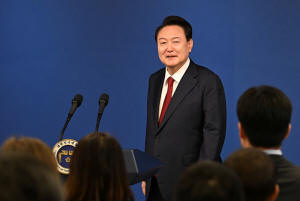Low expectations for rare summit between China, Japan and South Korea
 Send a link to a friend
Send a link to a friend
 [May 24, 2024]
By Hyonhee Shin, Antoni Slodkowski and Kaori Kaneko [May 24, 2024]
By Hyonhee Shin, Antoni Slodkowski and Kaori Kaneko
SEOUL/BEIJING/TOKYO (Reuters) -When South Korea hosts the first
trilateral summit with China and Japan in four years beginning on
Sunday, the three neighbours may struggle to go beyond surface-level
diplomacy after years of deteriorating ties, diplomats and officials
said.
Still, even handshakes would help maintain at least some high-level
diplomacy after a pause since the last such summit in 2019, according to
officials and members of the diplomatic community in Seoul and Tokyo.
President Yoon Suk Yeol will have bilateral talks with Chinese Premier
Li Qiang and Japanese Prime Minister Fumio Kishida on Sunday, then hold
their three-way gathering on Monday.
The absence of Chinese President Xi Jinping effectively keeps military,
foreign affairs, and security issues off the agenda, said Kang
Jun-young, director of Center for International Area Studies at Hankuk
University of Foreign Studies in Seoul.
On the agenda are economics and trade, climate change, cultural
exchanges, health and aging populations, science, and disaster response,
according to Yoon's office.
But the gathering will be constrained by the global concerns that have
increasingly divided U.S.-allied South Korea and Japan from China.
“I’ve been doing this for a long time – there are lots of bilateral
issues between the countries, but there isn’t anything we can do as a
group," said one diplomat based in the region. "We compete on a lot of
things and obviously South Korea and Japan are U.S. allies so that makes
things extra challenging.”
The diplomat said the summit would be mostly “cultural” and borderline
meaningless, but that China would likely seek something about supply
chain stability in the joint statement.

One South Korean official said just having the three countries meet
again after a long time is meaningful by itself.
Even without major breakthroughs on the toughest issues, the summit
could make progress in areas of practical cooperation like
people-to-people exchanges and consular matters, he said.
"That’s important as it could have a direct impact on people’s lives,"
the official said.
Two Japanese foreign ministry officials also said they did not expect
any big announcements from the meeting and that it was important for
optics that the summit resumed after a long gap.
A Japanese government official said on Friday that the countries had yet
to decide whether they would release a joint statement, in part because
simply setting up the meeting had faced scheduling difficulties.
The officials spoke on condition of anonymity to discuss diplomatic
proceedings.
China's foreign ministry spokesman Wang Wenbin told a briefing on
Thursday that Beijing hopes the talks "will inject new impetus into the
trilateral cooperation and provide better ways towards mutual benefit
for the three countries."
RESTRICTED ACCESS
Observers say to make any progress on even baseline issues, Beijing will
need to address South Korean and Japanese concerns about the increasing
difficulty of operating or doing business in China.
South Korean diplomats routinely complain about the minimal level of
access they get to senior officials in Beijing. They have also watched
apprehensively in recent months as China's partners, Russia and North
Korea, have become increasingly close.
[to top of second column]
|

South Korean President Yoon Suk-yeol attends a press conference
marking two years in office, at the Presidential Office in Seoul,
South Korea, May 9, 2024. SONG KYUNG-SEOK/Pool via REUTERS/ File
Photo

Japanese sources based in Beijing say they are most concerned about
visas, safety of staff, and IP protection, as well as the future of
auto exports to China in coming years.
Another bone of contention is the opacity of China's judicial system
and the arbitrary detention of foreign business people, said Akira
Amari, a senior Japanese ruling party lawmaker and former trade
minister.
"The CCP (Chinese Communist Party) and the government need to
establish clear standards for foreign investments and foreign
personnel, because without them, they can arbitrarily detain or
imprison people on a whim. If they continue on that course,
investments will stall, and they will close themselves off from the
world," he said.
Amari, who advises a parliamentary group promoting relations between
Japan and China, said Tokyo needed to have frank discussions with
Beijing so "that proper relations can continue and unnecessary
tensions don't increase".
U.S. INFLUENCE
The neighbours had agreed to hold a summit every year starting in
2008 but the initiative has been disrupted by diplomatic spats and
the COVID-19 pandemic.
A sore point for Beijing is the closer cooperation between South
Korea, Japan, and the United States in response to China's
muscle-flexing in the South China Sea and Taiwan.
Yoon has worked to improve ties with Japan, which occupied the
Korean peninsula and parts of China, among other areas in Asia,
before World War Two.
He has also more openly sided with Washington on issues ranging from
trade to democratically governed Taiwan, which China claims as its
own.
The summit is taking place against the backdrop of massive Chinese
war games around Taiwan in what Beijing has called punishment for
the island's new president, Lai Ching-te.
The Japanese official said that Taiwan may be addressed, and that
tone of such discussions may depend on what kind of military
activities take place around the island ahead of the summit.
China condemned Yoon last year after he told Reuters in an exclusive
interview that increased tensions around Taiwan were due to attempts
to change the status quo by force, and he opposed such a change.
Relations between South Korea and China have been frayed since the
installation in South Korea of the U.S. Terminal High Altitude Area
Defence (THAAD) system in 2017, under Yoon's predecessor, to better
counter North Korea's evolving missile threats.

(Reporting by Hyonhee Shin in Seoul, Antoni Slodkowski in Beijing,
and Kaori Kaneko in Tokyo; Additional reporting by Josh Smith in
Seoul, and Sakura Murakami, John Geddie and Tim Kelly in Tokyo;
Writing by Josh Smith; Editing by Stephen Coates and Kim Coghill)
[© 2024 Thomson Reuters. All rights reserved.]This material
may not be published, broadcast, rewritten or redistributed.
Thompson Reuters is solely responsible for this content. |